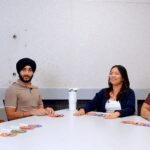How much do you know about On-Country learning? You might know a friend who took an intensive unit, heard about it in one of your classes or have seen it pop up on OASIS.
In simple terms, On-Country learning is a learning model that supports both Aboriginal and Non-Aboriginal students engage with Aboriginal ways of knowing, being and doing.
As Jayde Conway, Curtin’s Lead, Indigenous Cultural Capability, explains, On-Country learning is about building relationships with Aboriginal Elders, learning about First Nations culture on Country and gaining an understanding of Aboriginal culture and Australia’s colonial history.
At the heart of On-Country learning is the cultural understanding that learning is reciprocal. “As part of Aboriginal culture, an overarching law or way of life is around reciprocity – so you give something and get something back, in a mutually beneficial way.”
“To us, Country is living, breathing, has meaning, has life, has determined everything for us in the sense of rules and laws and boundaries. That’s our way of viewing the world as given to us by Country.”
“On-Country learning is really about building the relationship with country.”
Curtin currently offers two On-Country learning units available for both undergrad and postgrad students. The unit is intensive – it involves five days away from campus during tuition-free week and two assessments.
Jayde says the purpose of the unit is “to essentially help people to experience Aboriginal culture at its most optimum. It’s not really about us standing up and saying: ‘here’s all this information you need to know.’”
“There’s walking, there’s touching, there’s smelling, there’s tasting, there’s sitting, there’s listening. It really is quite a sensory, experiential type of learning and the purpose of it is to really see.”
But there’s also a deeper, more meaningful sharing of knowledge within the On-Country intensive – the understanding of Australia’s shared colonial history. “There’s knowledge about Australia’s story and our story, the First Nations story, and how they align, overlap, or contradict each other at times.”
Besides the sensory based experiences of the unit, Jayde says the benefits of taking the intensive include the opportunity you have to be able to build relationships with Elders, getting outside and away from university walls and having a safe space where you can be vulnerable, have open conversations and ask the hard questions. And she warns that it’s not easy in the way some people might think.
“You get to know yourself in different ways. A student who has done it will come away ‘transformed’ in a sense.”
Gabrielle Maynard is a Curtin graduate who completed her On-Country learning unit as part of a Graduate Certificate in Indigenous Australian Cultural Studies.
“For me, I’ve done three degrees at Curtin now and I feel like I learnt more in that week On Country than I had in my previous degrees. It was incredible, and it’s so cool that Curtin’s supporting Aboriginal ways of learning.”
When she first enrolled, she was excited to do more academic work in the space of Aboriginal culture in Australia and building relationships with the academics in the community. However, what she got out of the On-Country intensive was far more important.
“We didn’t have any preconceived notions of the learnings. The expectation wasn’t to learn the way Western people and tertiary systems are set up: read, and gain our knowledge that way. It was a new approach for me personally, because we’re so used to ‘here’s your readings for the week. This is what you’re going to be learning’, and you’re fully prepped walking into that classroom. But walking into this classroom, it was giving yourself to the experience.”
After a couple of safety briefings and inductions on the Monday morning of the intensive week, Gabrielle and her class got on a bus and headed down to Nowanup.
“We met Uncle Eugene Eades down there and we set up our tents and that was it. The rest was what Country wanted to teach us, not what we wanted to learn. We went with the flow and we worked with the weather and what Country was saying and wanted us to know in that moment.”
The rest of the week unfolded in a similar fashion. Between traditional food gathering and yarning, visiting culturally significant sites and learning about the more difficult parts of colonial history, native vegetation and medications – Gabrielle found herself fully immersed in country.
“It’s such a unique opportunity that you just don’t get. Most people in Australia would never have the opportunity to go On-Country with respected elders and Aboriginal educators and learn in such a meaningful way.”
Something that she will forever remember was how emotional the experience was. “It’s not a foreign culture, we have so much we could learn and benefit from and enrich our lives, if we just listen a bit more and be inquisitive. You don’t often equate study with having an emotional journey, and to me that was beautiful.”
Enrolments for semester 2, 2024 are now open. You can find out more information about the units below:
Listening to Country: First Nations’ Perspectives (INDS2004)
Graduate Listening to Country: First Nations’ Perspectives (INDS5010)



